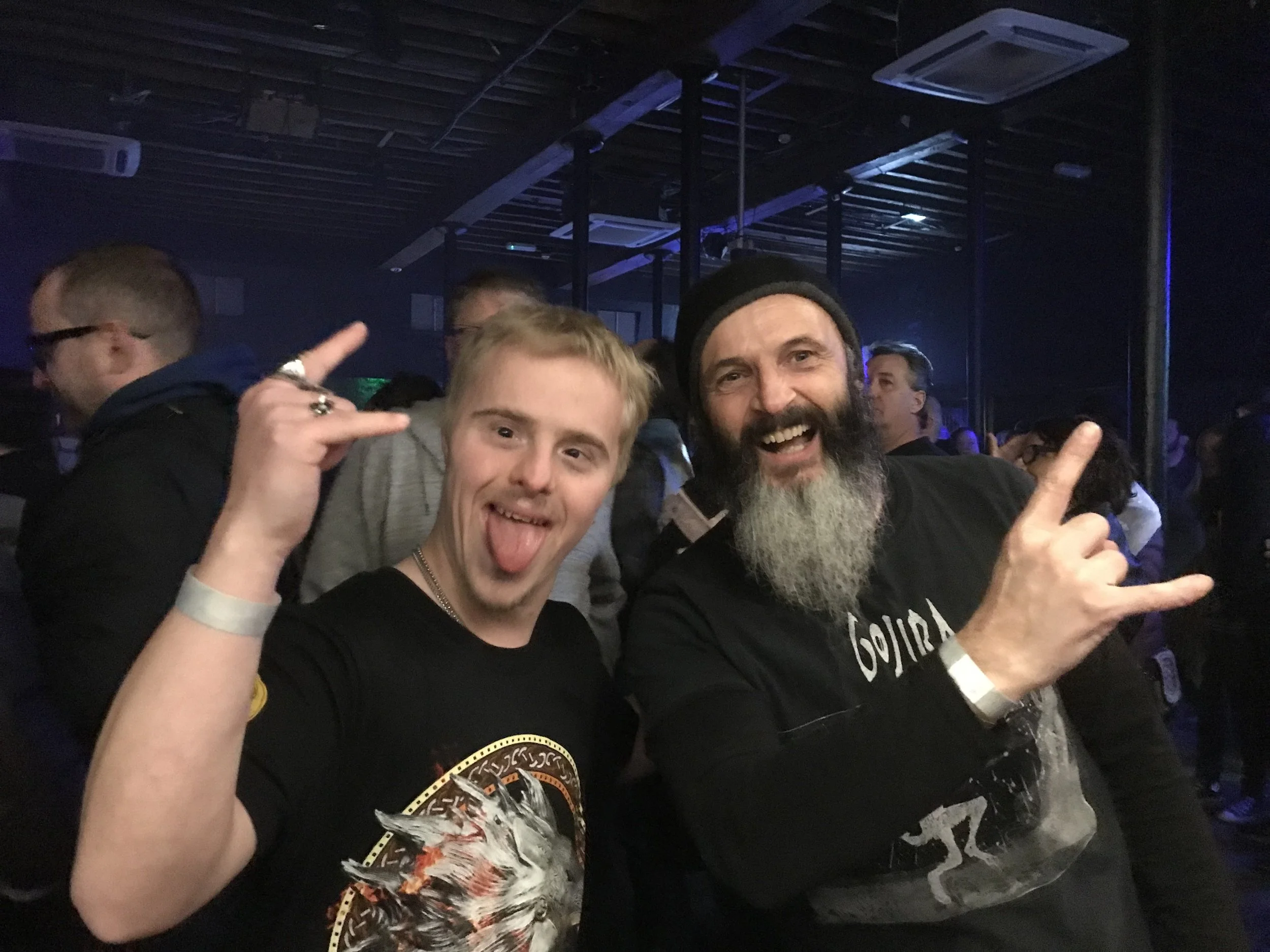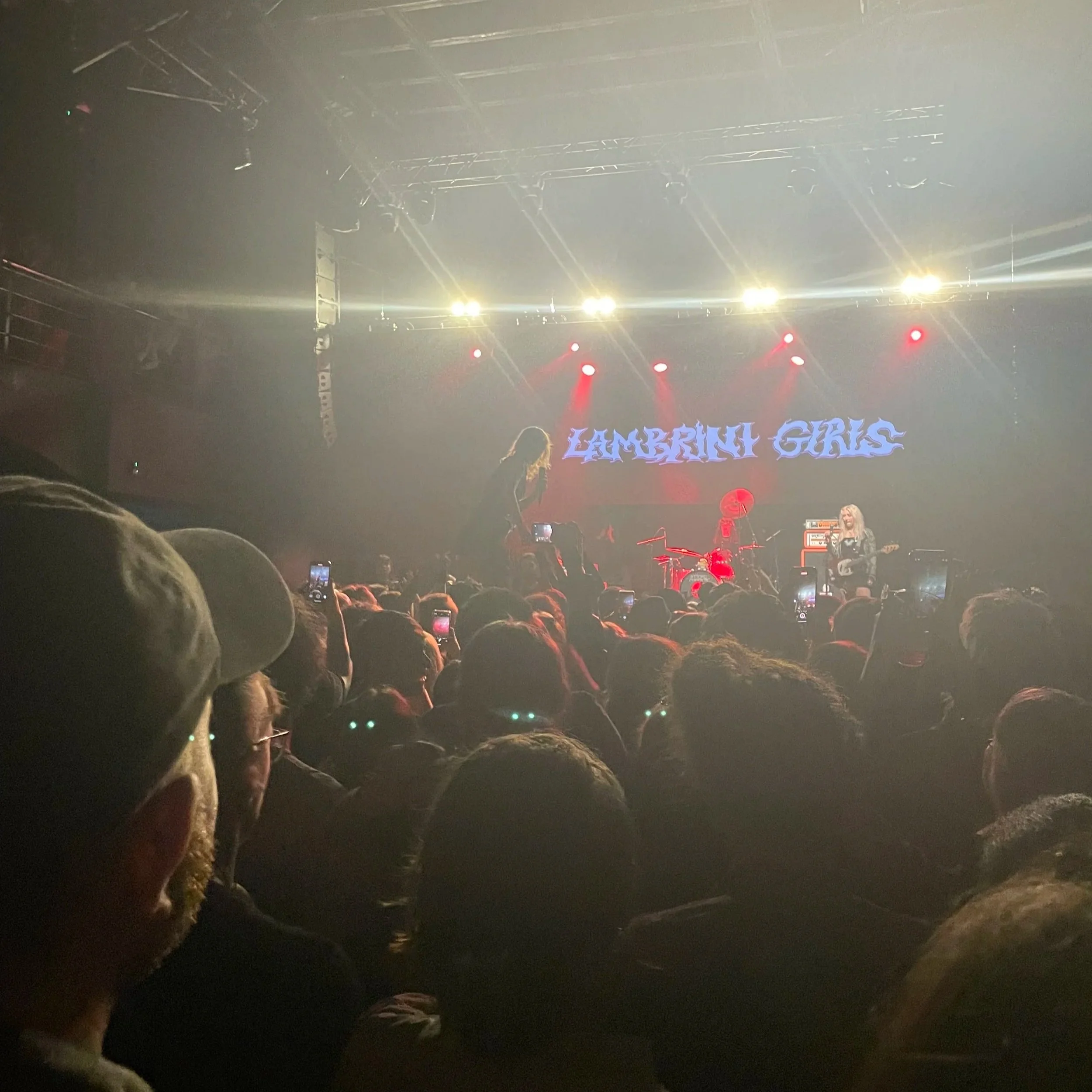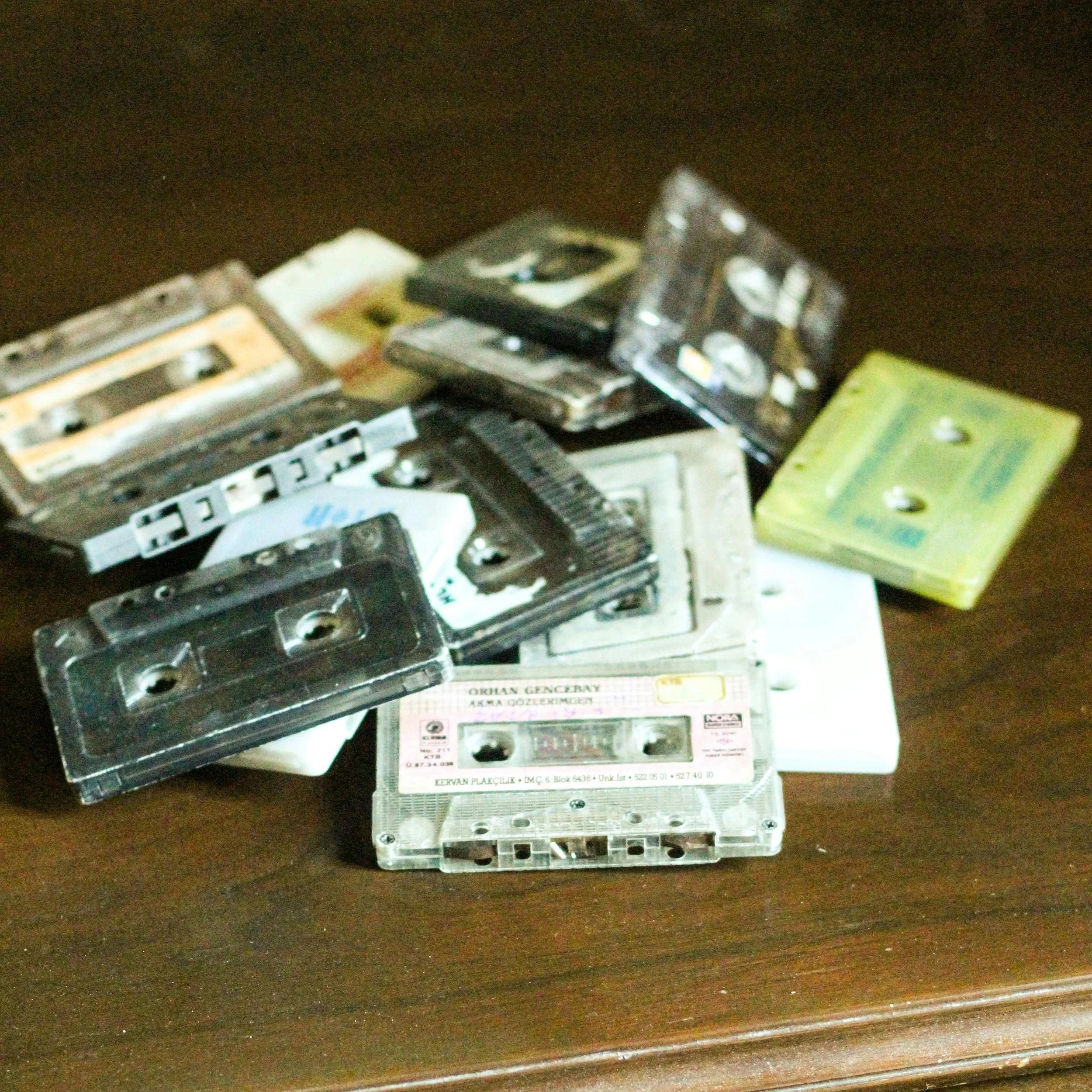Talking to: Gig Buddies
It’s no secret that Bristol has a buzzing arts and culture scene, whether you’re into all-night raves, contemporary art, ballet or mosh pits. So it’s fantastic news that the Gig Buddies scheme has come to Bristol via the Exchange. Gig Buddies is a program for adults with autism, learning disabilities or neurodivergences of any kind. The scheme matches volunteers and participants in a “buddy” scheme, allowing them to get out and enjoy gigs and live music at venues across the city, with the security of their buddy by their side.
Culture editor Kerry Mead caught up with Iwan Best, who works at the Exchange and helped set up the Bristol arm of Gig Buddies, to chat about how it works, the diverse range of buddies already paired up and how people can get involved.
First of all, tell us a bit about you. Who are you and what do you do outside of Gig Buddies at the Exchange?
I’m the bookings manager at the Exchange. I've known about the Gig Buddies scheme for a long time, and we wanted to set it up a few years ago when we were just a normal venue. But then, in 2018, we sold the venue to the community. And that means we're now a lot less focused on having to just survive day to day, and we've got more scope to do projects like this, which is really nice.
Can you explain a little bit about what Gig Buddies is, for someone who’s never heard of it?
Gig Buddies is essentially a befriending project, which aims to tackle the loneliness and isolation that can be felt by autistic people or people with learning disabilities, or any kind of neurodivergences. Their access to events and to culture is quite often restricted to their social circle, which can be just family members, very close friends or support workers. As a venue, we [at the Exchange] know some people who we quite often turning up with their dad or whoever, but the dad waits in the bar because he hates it and would rather be anywhere else. Obviously, it's great that he's coming to the gig, but what we want to offer is that opportunity to make new friends, to gain confidence and to gain skills – and we’re already seeing the difference. We're a really new project, none of our buddies have been out more than twice, maybe three times, with each other. And already we’re seeing [them change from] being shy and unsure in this unfamiliar environment.
Callum and his volunteer Brian who went to see Ed Force One, an Iron Maiden tribute act, at The Fleece in January 2022.
We've got one guy, he's a huge Iron Maiden fan, and loves drumming, and he went to an Iron Maiden tribute act at the Fleece and the band got chatting to him, and they got him up on stage to play drums to one of their songs. Seeing things like that is really nice.
And it's not just music, is it? You do different things all over Bristol?
Yeah, we try not to limit it. For example, we've got someone who wants to go and watch rugby; we try not to say that something isn’t included - you know, some of the other Gig Buddies projects are very much just music. But because Bristol is such a culturally vibrant city, we try to open it up to anything, and whatever kinds of events people want to go to but can't access. Obviously we’re running this from the Exchange, but we try not to mix our messages too much; we try to keep them separate in case people think that it's just for events at the Exchange. It’s not – we're just running the project.
Where did Gig Buddies start out?
The first one was in Brighton. It’s a charity called Stay Up Late. But we’ve also worked with Cardiff who are called Gig Buddies Cymru. We did our first fundraiser to cover startup costs with them as a joint thing. And the band IDLES were very helpful with that. Especially Dev, who used to work here. He helped get a lot of attention for that, and Radiohead did one tweet, which absolutely blew up. Then Radiohead ended up donating the first ever single disc vinyl pressing of Kid A, so we got to send that out to someone. But we were only allowed to say “it's a Radiohead record,” we weren’t allowed to say anything else. The person who got it shared the news online, and they were all trying to work out what it was. They guessed in the end - this was the real nerdy Radiohead fan community. That was great that Radiohead did that, it really helped.
How did you get involved then, and why? Have you got any particular personal attachment to this kind of charity?
My brother is autistic, and my wife has ADHD so I knew a bit, but it wasn’t really a case of my brother inspiring me, it was more from working at Exchange and seeing the people who come in with their dads or whatever, and who end up standing sheepishly at the back and maybe don't really have anyone to integrate with at the show, and lack the confidence. We got chatting to a few people and then we found out there was potential to work with IDLES on this fundraiser. Initially, we were just going to host a fundraiser because we've got loads of really good streaming equipment. Then I had to very quickly write a proposal to directors here, saying, “we should start this in Bristol, we should create our own one.” With IDLES’ involvement, we got a lot of attention very quickly, so we were like, ‘right, we need to sort this out now’ because everyone was talking about it online!
How’s the scheme going in Bristol? I know you said it's quite new. When did it start and has it taken off well?
It started to take off, and then the third or fourth wave of COVID hit over the winter so it's been a little bit jittery. We set up our first two buddy pairings in November and then every single matching meeting in December got cancelled because we need to meet people with their support workers, and even the support workers who didn't have COVID couldn’t come because everywhere was so short staffed. Everyone got hit so hard, everything just got cancelled, so we had a frustrating two months. But I think (famous last words!) that we're through that now. We've got a lot of people waiting to be matched who we just haven't been able to meet yet. But hopefully we’re getting back on track.
In what ways do you think that Gig Buddies is enriching for its participants?
I think it’s been really moving that, before we've even met them, when we've spoken to people who want to use the project, and when we’ve spoken to their parents, they’ll immediately say “Oh my God, this is the best, why does this not exist already?”. You know, we have a lot of hare-brained schemes here at the Exchange, and projects and events that we run, and we usually have to really sell them to people, but this is the one thing that people immediately agree on – that it’ll make such a difference to this person's life. The flip side of this is that we have to manage expectations because people are so desperate to have a buddy. We have to be clear that, you know, you can’t go out together every night!
We've seen that confidence just build so quickly, allowing people to have that connection to a music scene. I don't know for sure, but I suspect that if this guy who went to see Iron Maiden had gone with his mum, well, I don't think he’d have ended up drumming on stage with the band. But because he went with a friend who was able to help him speak to people and gain those social skills… these things can happen. Creating experiences like that, it’s just invaluable.
Volunteers also have planning meetings with their buddy, and even that’s a great opportunity. A participant might love metal, but they might only know Iron Maiden and AC/DC, because they've never had the opportunity to hear other metal bands. There's a good chance that they don't know what's coming up, they don't know about Bristol's metal scene. So we encourage volunteers to do things like putting together a Spotify playlist of metal bands that are playing in Bristol in the next six months, and just talking about it. People are finding those really positive.
What sort of people are getting involved with Gig Buddies as volunteers?
It’s amazingly diverse, which is obviously really important, because, essentially, we're working with vulnerable adults. For example, people who are gay or trans might sometimes feel more comfortable meeting someone who is also gay or trans. There's also a better chance that a gay or trans volunteer will be more integrated in that community, and they’ll know more about events going on that are suitable. A lot of people also feel more comfortable with someone their own age, which is understandable. There’s also a lot of diversity in terms of experience, which is something that we keep in mind when we match people. There are volunteers who, as far as I can tell, have never met an autistic person in their life. And we also have people come to us with thirty years of support work experience, and we have to sit there and train them!
It's brilliant that, in every way, we have a massive range of people. We were a bit worried after IDLES were so helpful that we’d do the first training session and it would be a room full of blokes with beards and IDLES t-shirts – but luckily it wasn’t! There are also people we know from the Bristol music community, or the punk scene or the queer scene – we have some people who run queer events here. It’s also great to see people get involved who have never been to the Exchange. So yeah, there’s a range of different experiences which is helpful for matching.
If anyone reading this is interested in volunteering, how do they go about that? And what are they looking at in the way of training and time commitment?
There’s an application form on our website. In terms of training, we go through the normal vetting process, we do DBS checks and we’ll have a chat with you and we do a day’s training, which so far has always been at the Exchange. And in terms of long-term commitment, we encourage people to try to meet twice a month and to actually go out, but ultimately, that's up to the volunteer and the person who wants to use the projects.
But we do really emphasise managing expectations, and just being really clear with people that, especially if the person they’re matched with really is very lonely, once a month will seem like a long, long time until they meet you again. It's important to be really clear from the start with “this is what I can do, this is what I can offer.” This makes it possible to forge a long term relationship that is sustainable for both parties because that process of getting a new gig buddy can be really stressful for people, so we always prefer to take it slow. We might have people who want a gig buddy, and loads of volunteers, but if there’s no one we feel is the right match, we just write to them and say, “we're not able to match you right now, but we're actively trying to find more volunteers and people who might suit you.” A volunteer might say, “I don't mind if it's an hour's drive,” but actually, six months later, they're going to get fed up with that. And, it’s really important to us to build relationships that we think will be as long lasting as possible.
And what sort of other projects does the Exchange have on at the moment?
We’re running a project called Go Gentle side by side with this. It’s like a companion piece to Gig Buddies really – while Gig Buddies aims to tackle that isolation and loneliness barrier that restricts people from going to typical shows, we’re also aware that some people have sensory preferences and can’t go to typical shows because of the lights or the sound or whatever. So we’re running a series of relaxed matinee gigs on the weekends, where we invite local and national touring acts to come down and do these totally stripped back shows; they play unplugged and leave the house lights on, and we put some chairs out, beanbags, yoga mats - whatever people need. And it's a big mixture in terms of audience – there are a lot of people with more typical sensory issues such as autism, and then there are older people, and people who have kids, as well a lot of people who just don't like gigs because they're too noisy. We've only run a few so far, but they've been lovely.
Check out Gig Buddies for more information about the UK-wide project run by Stay Up Late, and the Exchange for more on the Bristol arm of the scheme, including an application form to apply as a buddy (although the project is currently not taking on new volunteers).
Follow the Exchange on Facebook, Twitter or Instagram to keep up to date with their other events.
You can also write to info@gigbuddiesbristol.com for more info.








